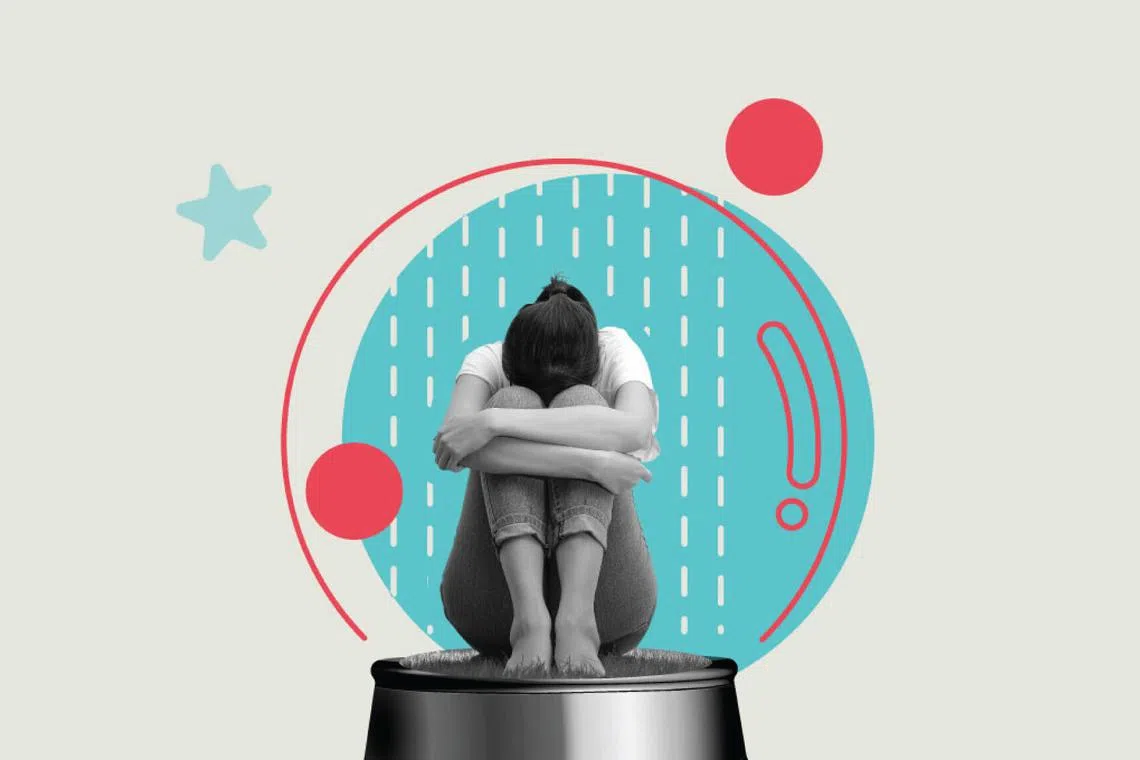No health without mental health
Feeling blue over the holidays? You are not alone
Sign up now: Get ST's newsletters delivered to your inbox

Experts say the holiday blues are very real for some.
PHOTO: ST ILLUSTRATION
SINGAPORE - For more people than you might think, the year-end holiday season of feasting and parties is a time to dread.
While others are celebrating with friends and family, they may be scrolling through their social media feed, feeling excluded and envying their peers at Christmas and New Year parties.
Some, on the other hand, may hate having to come out of their shells to attend social gatherings, finding these events to be excruciating.
People who have lost loved ones may feel especially sad during the holidays. And those who have moved from other countries for school or work may long for their families far away.
Experts say the holiday blues – a common phenomenon that describes transient feelings of sadness, anxiety or loneliness during the festive seasons – are very real for some.
A 2021 survey by the National Alliance on Mental Illness in the US found that three in five Americans feel their mental health is negatively impacted by the holidays.
The blues can be triggered by societal pressures, grief or unrealistic expectations about the holidays.
While it is normal for many people to experience those emotions, for some, they could result in an unceasing sense of emptiness or hopelessness, or feelings of being overwhelmed.
They may sleep poorly or find it hard to get up in the mornings, and suffer from a persistent low mood.
The most vulnerable groups could be socially isolated seniors and those suffering from depression and anxiety, though anyone of any age can be affected.
In more northerly latitudes, some people become depressed when winter sets in and the nights lengthen.
Seasonal affective disorder – a type of depression that occurs in certain seasons – is thought to be caused by a lack of sunlight setting off chemical changes in the brain, leading to symptoms of depression.
In Singapore, the loneliness and anxiety related to the fear of missing out, or Fomo, during the holidays affect a number of its youth clientele, said social service agency Shine Children and Youth Services.
Ms Ang Le Shan, a social service executive at Shine, said the agency tweaked its social media content in 2023 to focus on coping with loneliness during the holidays and navigating the expectations that arise in the new year.
Shine found that the seasonal posts attracted more saves, likes and shares than its year-round posts on managing exam stress and burnout, she said.
That is despite the fact that most young clients seek help at the start of the school year, and before important exams, for academic and work-related stress, or when they have problems in their relationships with their peers and family members, said Mr Eric Sng, an assistant director at Shine.
Ms Ang said the issues faced by youth over the holidays are the same as those that beset them at other times, such as the lack of emotional regulation.
Some youth report feeling excluded by their friends, based on what they see on social media, which inevitably invites comparisons with themselves, she said.
This is not surprising, as research has shown that adolescents who spend more than three hours a day on social media face an increased risk of having poor mental health outcomes, such as symptoms of depression and anxiety.
If young people feel lonely during the holidays, they should tell themselves that it is okay to feel this way, said Mr Sng. He advises them to take breaks from social media – of three days to a week, if possible – if it is making them feel bad about themselves.
Instead, they could use the time to connect with people who matter to them or to engage in self-reflection. They might use the time to identify things to be grateful for in the past year or to look forward to in the coming year, he added.
Other groups that may experience festive season blues are those who are estranged from their families or have recently suffered the loss of a loved one, or international students and foreign workers living amid new and unfamiliar cultures and environments, said Ms Andrea Chan, deputy director of Touch Mental Wellness at Touch Community Services.
“Many of our clients are lonely and do not have much social or family support. Hence, the year-end blues may hit them much harder,” she said.
“The focus on community and family events on social media and general advertisements can also exacerbate feelings of isolation, serving as constant reminders that they are alone, and feelings of being unloved and not belonging can start to fester.”
Individuals struggling with feelings of loneliness or grief tend to isolate themselves and not reach out to others for support, whereas the opposite may be much more helpful, said Ms Chan.
She advised those feeling down during the holidays to share their struggles with loved ones and friends who can provide emotional support during such times.
Finding purpose brings joy and meaning
Loneliness is an issue that can worsen during the year end, but this can also be a time for reflection on its root causes.
Spirituality can bring joy and meaning, and this could be missing from some people’s lives, said the Institute of Mental Health’s chief executive, Adjunct Associate Professor Daniel Fung.
Spirituality is the quality of being concerned with the human spirit or soul, as opposed to material or physical things.
Prof Fung, a child psychiatrist, believes it is important for young people to have self-awareness, a value system and purpose in life, whether it stems from religion or not.
“There is some evidence that having a spiritual dimension helps protect young people’s mental health, whether this is through religion where you believe there is a greater power than you or through self-fulfilment and believing in yourself.”
Schools could also play a role in instilling deeper values in children, to look outwards of themselves and not inwards, he noted.
“In Singapore, we care for the elderly, and we look after the people who care for us, the less privileged.
“I think if you can teach that, it’s very powerful. You can also talk about what is right and wrong,” he said.
The year end can also be a time to engage in positive actions.
For instance, parents can create meaningful experiences for their children, who can fall back on those memories in time as a reservoir of strength.
Prof Fung said: “I think if you have that kind of foundation, it really strengthens you in life, so that you don’t end up thinking that people are always trying to take advantage of you, that there are people who care, and better still, there are people who care without sort of expecting anything in return. Those experiences are powerful.”
The benefits that come from spirituality also apply to adults, he said.
Loneliness stems from a person’s relationship with others, and the holiday season can be a time when people show their love for others.
This can involve volunteering activities, he said.
Other spiritual experiences include spending time in nature, meditation, prayer or deep reflection.
This holiday season, if you feel caught up in gift giving, socialising or just having to show that you are having the time of your life, take a deep breath and focus on your deeper needs.
Adjunct Associate Professor Angie Chew, a mindfulness expert, suggested that people consider working on freeing themselves of grudges.
“Include forgiving as part of the season of giving because forgiveness liberates you from the burden you carry in your heart, which is nothing more than beliefs that someone has wronged you, and not seeing that you had a part to play in it,” said Prof Chew, who is chief executive of the Brahm Centre, a mental health charity committed to fostering happier and healthier lives.
“When we pause and reflect on what happened, what hurt us, we learn, and we become wiser as we learn. And that is spiritual growth.”




